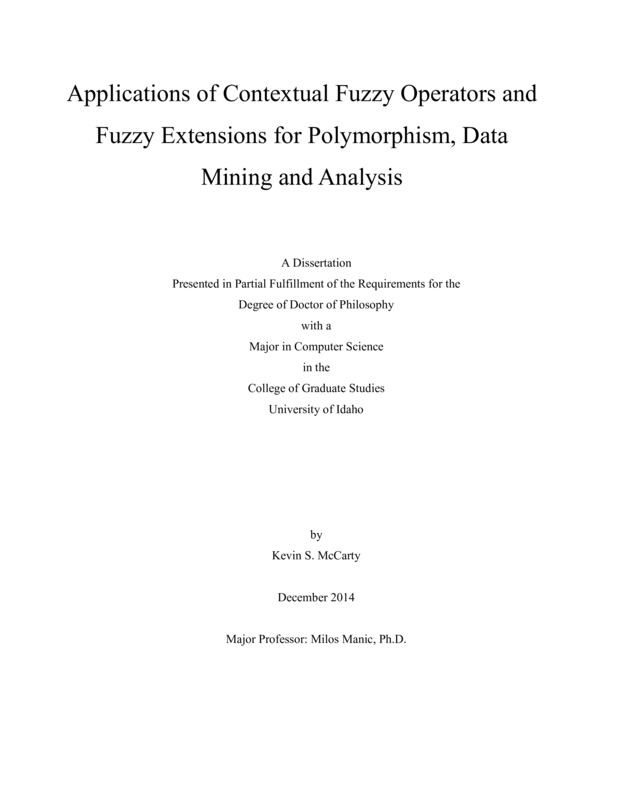Applications of Contextual Fuzzy Operators and Fuzzy Extensions for Polymorphism, Data Mining and Analysis
McCarty, Kevin. (2014). Applications of Contextual Fuzzy Operators and Fuzzy Extensions for Polymorphism, Data Mining and Analysis. Theses and Dissertations Collection, University of Idaho Library Digital Collections. https://www.lib.uidaho.edu/digital/etd/items/mccarty_idaho_0089e_10423.html
- Title:
- Applications of Contextual Fuzzy Operators and Fuzzy Extensions for Polymorphism, Data Mining and Analysis
- Author:
- McCarty, Kevin
- Date:
- 2014
- Keywords:
- Data Mining Fuzzy Polymorphism Software Engineering
- Program:
- Computer Science
- Subject Category:
- Computer science
- Abstract:
-
System behaviors and processes are often influenced to a large degree by external conditions. As those conditions change, so must any corresponding behavioral response. Driving a car from point A to point B when the road is straight and smooth is a dramatically different operation than if the surface is a sheet of ice with twists and turns. Even more challenging is when both surfaces are part of the same problem, say when a car must navigate a patch of "black ice" on the highway. Significant changes in the nature of a problem, such as when a surface changes from asphalt to ice, are called Situational Discontinuity Problems (SDPs) and present a distinct challenge to computer scientists and programmers.
First, behaviors which might be appropriate for past problem states are inappropriate for future states. Second, data discontinuities, make it difficult to describe all-encompassing actions without a "frame of reference". Even well-known problems such as simple noise and outliers pose problems for processes. Third is the general uncertainty surrounding SDPs in or near transition states where multiple approaches are equally desirable.
Traditional approaches to SDPs involve generalizing an existing algorithm. This has the undesired side-effect of greatly increasing complexity while also providing a diminishing ability to further extend the algorithm. Fuzzy Contexts, or Fuzzy Logic Type-C with Fuzzymorphism, is an architecture designed to allow process extensions to solve SDPs or other disparate problems while also minimizing complexity and diminishing returns.
This dissertation explores prior work and methods used to solve SDPs and their limitations. It then introduces the notion of Fuzzy Contexts and Fuzzymorphism in a novel software framework supported with database extensions, a database-driven and XML-based configuration language, combined with evolutionary and local search techniques. It further explores the use of the framework and the Type-C architecture in various processes from data mining to robotic control in order to improve upon existing techniques.
- Description:
- doctoral, Ph.D., Computer Science -- University of Idaho - College of Graduate Studies, 2014
- Major Professor:
- Manic, Milos
- Committee:
- Heckendorn, Robert; Stan, Sergiu-Dan; Dialani, Vijay
- Defense Date:
- 2014
- Identifier:
- McCarty_idaho_0089E_10423
- Type:
- Text
- Format Original:
- Format:
- application/pdf
- Rights:
- In Copyright - Educational Use Permitted. For more information, please contact University of Idaho Library Special Collections and Archives Department at libspec@uidaho.edu.
- Standardized Rights:
- http://rightsstatements.org/vocab/InC-EDU/1.0/

